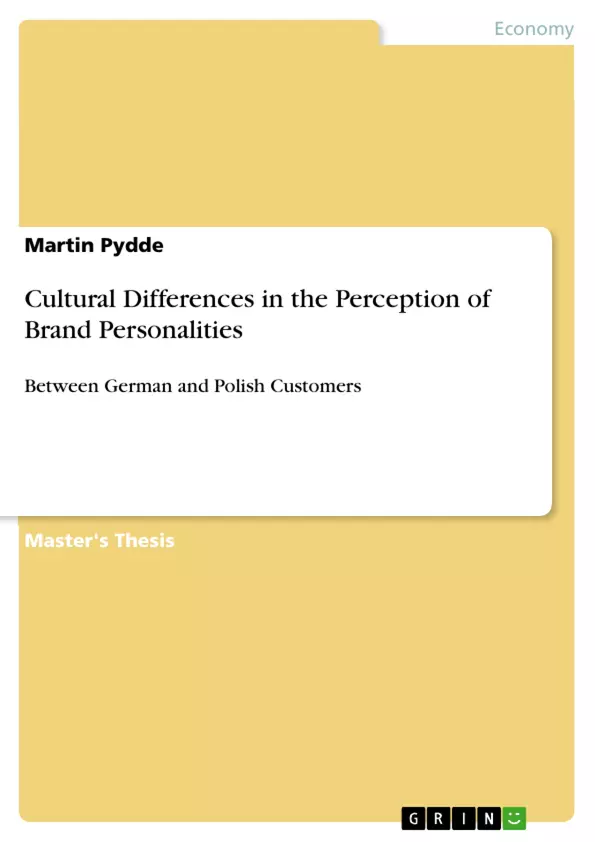Anthropomorphization happens whenever human characteristics are imputed to in-animate objects. This aptitude is observable in all cultures because it simplifies the interaction with nonliving objects (Fournier 1998, p.344). In search for ways to en-courage lasting costumer relationships the brand personality concept becomes a more prominent anthropomorphization in marketing. Brand personality is: “the set of hu-man characteristics associated with a brand” (Aaker 1997, p. 347).
Aaker’s brand personality scale was chosen for the purpose of this paper to create and analyze an online survey among Polish and German people in order to assess cultural differences in the perception of brand personalities.
Inhaltsverzeichnis (Table of Contents)
- 1 Theoretical Foundation
- 1.1 The Brand Personality Concept
- 1.2 Measuring Brand Personality
- 1.2.1 Evolution of Measurement Tools
- 1.2.2 The Five Dimensions of Brand Personality
- 1.2.3 Binary Free Choice Approach
- 1.3 Defining Culture
- 1.3.1 Approaches of Cultural Studies
- 1.3.2 Operationalizing Culture
- 1.3.3 Cultural Differences between Poland and Germany
- 2 Empirical Research
- 2.1 Data
- 2.1.1 Data Specification
- 2.1.2 Data Manipulation
- 2.2 First Survey
- 2.2.1 Descriptive Statistics of the Sample
- 2.2.2 Analysis
- 2.3 Second Survey
- 2.3.1 Descriptive Statistics of the Sample
- 2.3.2 Analysis
- 2.1 Data
- 3 Discussion
- 3.1 Limitations
- 3.2 Comparison of Findings
- 3.3 Implications
- 4 Conclusion
- 4.1 Summary
- 4.2 Future Direction
Zielsetzung und Themenschwerpunkte (Objectives and Key Themes)
This thesis aims to investigate the impact of cultural differences on the perception of brand personalities. Through the application of Aaker's brand personality scale, the study analyzes the perceptions of Polish and German consumers regarding various brands. The key themes explored in the thesis include: * **Brand Personality Concept:** Examining the theoretical framework and application of brand personality in marketing. * **Cultural Differences:** Analyzing the impact of cultural factors on brand perception. * **Measurement of Brand Personality:** Exploring the evolution of measurement tools and the five dimensions of brand personality. * **Cross-Cultural Comparison:** Comparing the perceptions of brand personalities between Polish and German consumers. * **Empirical Research Methodology:** Utilizing online surveys and statistical analysis to gather and analyze data.Zusammenfassung der Kapitel (Chapter Summaries)
This section focuses on the main themes and arguments presented in the thesis. * **Chapter 1: Theoretical Foundation** provides a comprehensive overview of the brand personality concept. It examines the evolution of measurement tools, specifically focusing on Aaker's brand personality scale and the five dimensions of brand personality. Furthermore, it defines culture and explores different approaches to cultural studies, operationalizing culture, and highlighting the cultural differences between Poland and Germany. * **Chapter 2: Empirical Research** details the methodology and data analysis conducted for the study. It discusses data specification, manipulation, and the results of two surveys. The first survey focuses on descriptive statistics and analysis of the sample, while the second survey delves deeper into the analysis of the five dimensions of brand personality. * **Chapter 3: Discussion** analyzes the findings from the empirical research. It explores the limitations of the study and compares the results obtained from the surveys. The chapter further discusses the implications of the findings for marketing strategies and consumer behavior.Schlüsselwörter (Keywords)
The primary focus of this thesis lies in exploring the relationship between cultural differences and the perception of brand personalities. The core concepts explored include brand personality, cultural dimensions, consumer behavior, cross-cultural research, and online surveys. The study utilizes Aaker's brand personality scale as its primary measurement tool and examines the perceptions of Polish and German consumers towards various brands. This research contributes to the understanding of how cultural factors influence consumer decision-making and the development of effective marketing strategies.Frequently Asked Questions
What is the brand personality concept in marketing?
Brand personality refers to the set of human characteristics associated with a brand. It is a form of anthropomorphization used to encourage lasting customer relationships.
How did Aaker's brand personality scale influence the research?
Aaker's scale was used as the primary measurement tool to analyze five dimensions of brand personality through online surveys among Polish and German consumers.
What are the five dimensions of brand personality?
The thesis explores the standard dimensions established by Aaker, which help in categorizing how consumers perceive different brands as if they were human entities.
What cultural differences were found between Poland and Germany?
The study investigates how cultural factors in Poland and Germany lead to different perceptions of the same brands, highlighting the impact of cultural dimensions on consumer behavior.
Why is anthropomorphization important for brands?
Anthropomorphization simplifies the interaction between humans and non-living objects, making brands more relatable and helping to build stronger emotional connections with consumers.
- Quote paper
- Martin Pydde (Author), 2008, Cultural Differences in the Perception of Brand Personalities, Munich, GRIN Verlag, https://www.grin.com/document/127663



